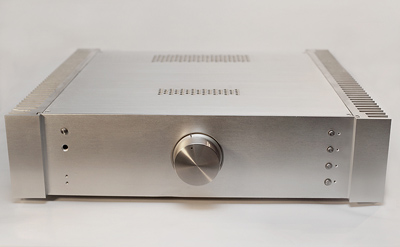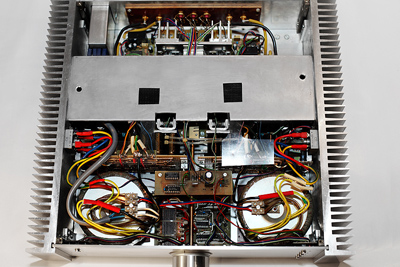In search for the perfect sound
Integrated Hi-End power amplifier
Built between 1998 and 2001, when I was having a lot of free time (but a bit less of experience).

| Specifications: |
| Output power: | 2x120W |
| Output power (class A): | 5W (9W) |
| Number of inputs: | 3 (RCA) |
| Harmonic distortions THD (8W by 4Ω load): | <0.004% (*) |
| Harmonic distortions & noise THD+N (8W by 4Ω load): | <0.035% (**) |
| Intermodulation distortions IMD (8W by 4Ω load): | <0.006% |
| Frequency bandwidth (-1dB) | 0-300Hz |
| Protection circuits: | Overheating,
shortcircuit,
DC offset & distortion detection |
* - Internal measurement card THD is 0.0014%
** - Internal measurement card THD+N is 0.0046%
Construction
The case is built completely from aluminium, two massive blocks of radiators that
constitute sides of the metal casing are efficient enough to sink the heat from
all power transistors working in class A in quite a large range of output power (up to 9W).
There are 3 unbalanced inputs (RCA) although looking at the front panel one my think it has 4 inputs.
It’s not the case however.
The last button is used to switch the bias current of output transistors allowing to increase
the maximum output power at which the amplifier works in class A from 5 to 9 Watts.
The amplifier is equipped in a number of protection circuits, which turn off the power
supply and disconnect speakers immediately in any of the following cases:
- overheating,
- detection of significant distortions of the output signal in comparison to the input signal.
This single circuit protects the equipment against a number of cases:
- DC voltage offset on the output,
- internal misbehavior of the amplifier,
- parasitic oscillations,
- short circuit of the output connectors.
The controlling unit checks also the amplifier condition before connecting the speakers
to the output. It won’t let them to be connected until any of the above listed conditions occur.

The whole amplifier works in dual-mono configuration. As you can see on the picture the
power supply is based on two giant toroidal transformers. Both channels have separated rectifiers
and a battery of filtering capacitors of capacitance in total above 94000μF per channel.
To minimize the internal resistance of filtering capacitors as a whole I have used 40 smaller capacitors
(4700μF). Side effect to that was a problem with turning on the amplifier.
Initially the power supply module was much simpler and it was equipped only in 18800μF of capacity
per channel. But this alone caused my apartment main fuses to blow off from time to time.
After I decided to upgrade the power supply modules (in 2007) and increased the filtering
capacitance 5 times a soft start circuit became a must.
The amplifier is integrated with the pre-amplifier which is based only on discrete elements and
working in pure class A configuration within full input signal range (5Vpp).
There is no single separating capacitor in the audio path and voltage output offset is eliminated
by employing a DC servo circuit. The end power amplifier is based on the excellent
IGBT transistors from Toshiba.
Configuration and listening
At the moment the amplifier I’ve built is working in the following configuration:
- source: AudioLab 8200CD,
- interconnect: FlatLine Blue Haven,
- speaker cables: FlatLine Blue Haven,
- speakers: JMLab Cobal 826.
As for the listening experience I should not be allowed to express myself as
my opinions will be definitely biased here. I did many listening sessions with friends.
Once we managed to compare my CD player with Marantz SA-15S2. Although both constructions
provide a top quality sound we were still able to tell the slight difference between both of them
in regards of reproduction of the lower bass registers. This could possibly prove that
the amplifier is good enough to allow such comparisons.
Nevertheless it works for 12 years already and provides many pleasant hours of
listening to my favorite music.